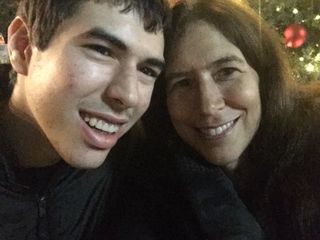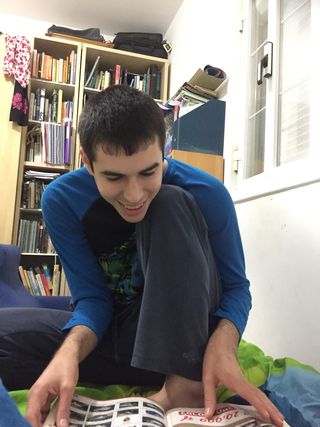
Autism
A Nest That Will Never Be Empty
Hannah Brown writes about life with her 24-year-old autistic son.
Posted May 22, 2020

“The empty nest is underrated,” wrote the essayist and movie director Nora Ephron.
She didn’t know the half of it.
I’ve heard my friends’ laments after their children have moved on to college. What are they going to do with themselves now? They’ll hardly ever see their kids again! They really sound sad.
That’s not a problem I’ll ever have, at least not with my older son, Danny, who is 24, because he’s autistic. During the week, he lives and works in a group home about 40 minutes away. But I pick him up every Friday afternoon and bring him back at the end of the weekend. If, for some reason, I’d like to make other plans, plans that don’t involve him — tough. They don’t have the staff to look after the residents on the weekends. I am divorced and he is with me most of the time on most weekends.
Don’t get me wrong. I love spending time with Danny and our weekends are a lot of fun. But am I ever envious of my friends with non-special needs children, friends who can sleep late on weekends, go to movies not geared towards children, work if they need to and even travel? You bet I am.
Here are a few scenes from the nest that will always be full, the parallel universe of having a child on the autism spectrum.
Danny can’t be left alone. While he is capable of doing many things on his own — he can read and write, make his bed, fix himself a snack (if it doesn’t involve using the stove or the microwave), etc. — but if there were an emergency, he couldn’t handle it. He talks all the time, about whatever pops into his head. Often it’s about a cat we had that died in 2003. But if there were a fire, for example, I’m not at all sure he would be aware enough to get himself out of the apartment right away and tell the neighbors. He certainly couldn’t call the fire department and explain what was happening. They worked on this with him in school and I try to teach him these emergency measures at home. Sometimes he seems to get it, but if he were engrossed in watching a movie — Toy Story 2 is his favorite and he watches it every Friday — he wouldn’t look up. In any case, although there is a slim possibility he might take appropriate action to save himself, I can’t count on it.

Neither can he travel by himself. He knows our address and our bus stop. But, in spite of years of instruction, he is still too impulsive to look both ways before he crosses the street. He is now in charge of the recycling in our family, but I have to walk him across the street to the recycling bins. And if he were out in the world alone, he would be an easy target for thugs, bullies and predators. If someone told him that his mother said he was supposed to go home with them, he just wouldn’t have the skills to be skeptical, to tell them to get lost.
I don’t expect sympathy and our lives are not tragic. On the contrary: In the autism world, we are extremely fortunate on so many fronts. The fact Danny is in a well-run group home is a phenomenal stroke of luck. I know so many families who don’t have a place for their adult autistic children to live and work, and usually one parent has to spend much or all of his or her time taking care of that child. From Monday to Friday, Danny lives in a very supportive community where he is learning carpentry and takes art and music lessons. It’s rare to find a place that is able and willing to teach new skills to someone with autism who has “aged out” of the school system, as Danny did two years ago.
When he was little, I thought I would keep him at home until I died, but I realized that it’s good for him to be independent from me, to spend time living and working with other people. I also saw families that lacked plans for their autistic children face a crisis if a parent became ill or died; a solution suddenly had to be found for the child, under pressure.
Our weekends aren’t like your weekends, but they’re not bad. We have a routine. Danny helps me shop on Friday and, as I mentioned, watches Toy Story 2, not 1 or 3 or 4. He can’t tell me why it’s his favorite but he laughs a lot at Al, the greedy toy-store owner who wants to sell Woody to a toy museum in Tokyo. Or maybe it’s because he likes the song that Jessie, the cowboy doll, sings about how her owner, Emily, abandoned her when Emily became a teenager. Danny still has his dolls and I can tell when he has had a difficult time falling asleep because in the morning his bed is filled with Buzz and Woody dolls, teddy bears and Elmo. On Saturday mornings, we go to a synagogue where Danny is a valued member. We also go to the zoo. After the zoo, we watch a movie. One week it’s Cars, the next, Space Jam. Sometimes people visit and Danny is always happy to see them.
He’s much more relaxed than when he first became an adolescent and it’s easier than ever to spend time with him. Even his younger brother, who used to (understandably) resent all the attention Danny got, has recently taken to teaching Danny songs by his favorite metal bands. Danny enjoys being with the brother he adores and happily croons Metallica and AC/DC tunes.
When I’m with Danny, I’m nearly as in the moment as he is. But when I hear parents talking about their young adult children, I am flooded with jealousy. I used to avoid Facebook during graduation season, so I wouldn’t have to see all the photos of grinning high school and college students. The wedding photos can pop up at any time. Of course I want to feel happy for my friends whose children are graduating, getting married and having kids. But I want that so much for Danny it hurts. And on some level, I think he also wants that for himself. He has often developed crushes on girls and young women. Currently, he seems to be in love with a 17-year-old girl at our synagogue and if I look away, he starts following her around during the kiddush after services. I’ve talked to her and she says she likes him and he doesn’t make her feel uncomfortable, another stroke of luck. He loves weddings: the ceremony, the music, the dancing, the cake. I don’t know how much he understands about how unlikely it is that he will ever marry or have a girlfriend or how he feels about that. This is the part of it all that makes me the saddest.
On the rare weekends that Danny and his brother spend the entire time with their father — when my nest is empty for a moment — I am so excited about the freedom I don’t know what to do first. I’ve actually been able to travel for work a few times and I’ve enjoyed every second of these trips. If I could just take off like this anytime, of course, I would take it for granted, as most people do. Being able to sleep past 7 a.m. on a Saturday morning or seeing a movie that doesn’t star Buzz and Woody on a Friday night are just fantasies for me, but they’re fleeting. The fantasy I keep coming back to — the one that lingers — is the wish that Danny could create his own nest one day, not because I can’t accept him for who he is but because believe that’s what he wants, too.
I wish I could stop dreaming this dream; if I gave up on it, it would be easier for me to look at the graduation and wedding photos. But it’s not so simple to give up on a dream. Sometimes, I think about Jessie the doll and the girl who outgrows her in Toy Story 2. Does Danny feel like Jessie as he sees his younger brother growing up and getting ready to move out of the house? I wish he could tell me.
Hannah Brown is the author of the novel, If I Could Tell You, about families raising children with autism, and she is the movie critic for the Jerusalem Post.



